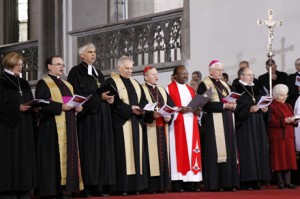I attended an ecumenical prayer service for Christian unity in 2011. A Baptist pastor, United Church of Christ pastor, United Methodist pastor and our parish priest took part.
As we prayed together, my heart went out to the Protestant ministers. I see them, and I think of my dad, the Protestant minister. Simultaneously, I find myself overwhelmed by the great divide and the burning desire within me to be able to share in a meaningful way what I have come to love and cherish in the Catholic Church. But an ecumenical prayer service is not the right place for that. It is not a moment for apologetics; it is a moment for prayer. Father, make us one.
I feel caught between what is and what should be. I feel the pain of it. I literally ache for the remedy.
As I prayed, I felt fully a preacher’s daughter and fully a Roman Catholic. It was like being the child of divorced parents, and you finally have your parents in the room together. And that is wonderful, but your heart wants more. Your heart wants full reconciliation between those you love so dearly.
And it’s even more difficult because you know that your Mother (the Church) wants it — though she may not have always known how to show it. You sense how close they are to reconciliation. And that just might be the hardest part of all.
I wanted to cry over what isn’t. But I also wanted to thank God for even this much.
It is a cross, this standing-in-the-gap. I care deeply for Protestant clergy because I was raised in a preacher’s home, and I can see my own father’s face on the faces of those pastors. I loved being a preacher’s daughter. I did not become Catholic to get away from being Protestant. I wasn’t trying to leave anything. I became Catholic to receive more of Christ — all of Christ — in the Eucharist.
I love being Catholic. I am home. I see the full helping of goodness laid out before me — all that I share in the nearly 100 columns I have written for newspapers and magazines – and all that I keep quiet in my heart.
So I stand and lift high this cross — lifting it up to the cross of Christ.
And when I’m with my father’s family, I tell them how wonderful our Mother is.
For the Quakers, I tell them that nobody is more active in social justice than Mother Church. Nobody knows contemplative prayer like Our Mother.
For the Wesleyans, I highlight the importance of sanctification and personal holiness. Nobody places a higher premium on these things than Mother Church.
For the Presbyterians, I affirm the Church’s adherence to all that the Early Church Fathers taught. How she holds to the Creed. She’s sacramental and liturgical. And she knows that everyone is invited to the waters of Baptism.
For the Assemblies of God family, I speak of the Holy Spirit. I remind them that Catholics believe in the charismatic gifts of the Holy Spirit. Catholics believe that we become sealed with the Spirit, always and forever when we are Confirmed, through the laying on of hands, through apostolic succession. The Holy Spirit descended at Pentecost and rested on Mother Church. We have always believed in signs and wonders.
We are saved by grace. Yes, we believe that.
Christ is coming back again and will raise us to new life. Yes, we believe that.
 We love Sacred Scripture. And we believe the Holy Spirit guided Mother Church so that she would know what to include in the Canon of Scripture.
We love Sacred Scripture. And we believe the Holy Spirit guided Mother Church so that she would know what to include in the Canon of Scripture.
But where do you go if you want all of it, I ask my family and friends. Where can a believer go who wants social justice and is a contemplative, believes that sanctification and personal holiness are necessary, knows what the Early Church taught and holds it dear, is sacramental, liturgical, charismatic, believes in grace, knows that Jesus Christ really will come back again, and loves the Bible dearly?
Where is that church family?
Praise to you Lord Jesus Christ, because that Church does exist. Christ Himself founded her on solid rock. Where do you go if you want it all? You go home.
Dad, it’s time to come back home. Mother is waiting. The children are waiting, too.
As Catholics, we believe that unity is possible. We’ve been praying for it for a very long time.
I see the pastors, and I think of Dad. I see the priest, and I think of Mother Church. And I feel like the child of estranged parents. There’s joy, because I see them trying.
I look at the cross and think, now is an acceptable time.




